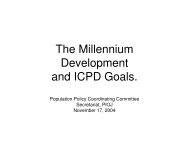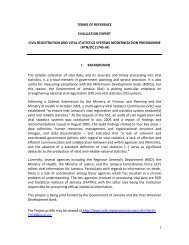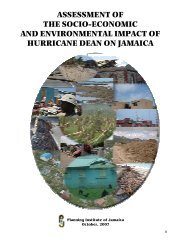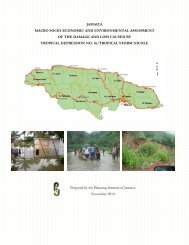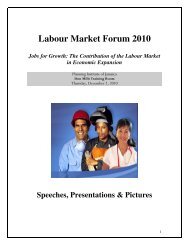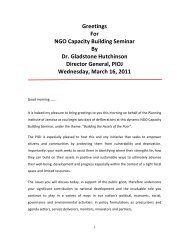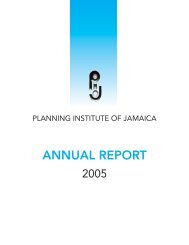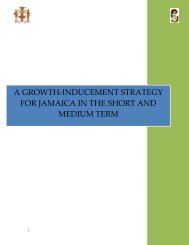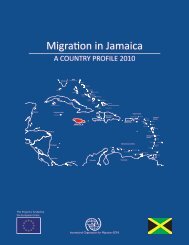Beginnings Issue 12.pub - Planning Institute of Jamaica
Beginnings Issue 12.pub - Planning Institute of Jamaica
Beginnings Issue 12.pub - Planning Institute of Jamaica
Create successful ePaper yourself
Turn your PDF publications into a flip-book with our unique Google optimized e-Paper software.
P a g e 13 I s s u e 12<br />
Trade<br />
The United Nations estimates that unfair trade rules deny<br />
poor countries $700 billion every year. Less than 0.01 per<br />
cent <strong>of</strong> this could save the sight <strong>of</strong> 30 million people.<br />
(Source: ChristianAid)<br />
International trade is worth $10 million a minute. 70 per cent<br />
<strong>of</strong> this is controlled by multinational corporations. (Source:<br />
ChristianAid)<br />
DID YOU KNOW?<br />
Did you know that in our world today:<br />
on aid. If the UK met the 0.7 per cent target by 2008, an extra 1.5<br />
million people could beat poverty that year. (Source: Save The<br />
Children)<br />
To achieve 0.7 per cent, the UK needs to increase its aid budget by £3<br />
billion. It sounds huge, but it is possible - the UK government found<br />
£5.5 billion to fund the 'war on terror'. (Source: Guardian)<br />
Rich Country Aid Commitments: The good the bad and the ugly<br />
The poorest 49 countries make up 10 per cent <strong>of</strong> the world's<br />
population but account for only 0.4 per cent <strong>of</strong> world trade.<br />
Their share has halved since 1980. (Source: ChristianAid)<br />
World trade robs poor countries <strong>of</strong> £1.3 billion a day - 14<br />
times what they get in aid. (Source: CAFOD, 2003)<br />
The prices <strong>of</strong> many poor countries' key exports are at a 150-<br />
year low. (Source: ChristianAid)<br />
It is estimated that rich countries are gaining $141.8 billion<br />
per year in trade and Africa is $2.6 billion per year worse <strong>of</strong>f.<br />
(Source: ChristianAid)<br />
Rich countries spend $100 billion a year to protect their<br />
markets with tariffs, quotas and subsidies - this is twice as<br />
much as they provide in aid for developing countries.<br />
(Source: Oxfam)<br />
Current trade rules force Mexican farmers who live on a<br />
dollar a day to compete with American farmers receiving<br />
subsidies <strong>of</strong> more than US$20,000 a year. (Source:<br />
ChristianAid)<br />
The average cow in the EU receives more than $2 a day in<br />
subsidies, whilst more than 3 billion people in developing<br />
countries are struggling to survive on less than this. (Source:<br />
Cafod)<br />
The EU gives $86.8 billion a year to its farmers in subsidies.<br />
Just $5 billion could help give everyone in the world access to<br />
safe water and sanitation. (Source)<br />
On average, c<strong>of</strong>fee farmers are getting $1 a kilogram while<br />
consumers are paying about $15 - a mark up <strong>of</strong> 1500 per<br />
cent. (Source: Oxfam)<br />
Aid<br />
In 1970, 22 <strong>of</strong> the world's richest countries pledged to spend<br />
0.7 per cent <strong>of</strong> their national income on aid. Thirty-four years<br />
later, only 5 countries have kept that promise. The UK hasn't.<br />
(Source: Save The Children)<br />
In 2002/3 the UK spent just 0.3 per cent <strong>of</strong> national income<br />
Debt<br />
Seven Million children die each year as a result <strong>of</strong> the debt crisis.<br />
(Source: DC, 2001)<br />
For every £1 in grant aid to developing countries, more than £13<br />
comes back in debt repayments. (Source: World Health Report 2000)<br />
Every year Sub-Saharan Africa, the poorest region <strong>of</strong> the world,<br />
spends $14.5 billion repaying debts to the world's rich countries and<br />
international institutions such as the World Bank and International<br />
Monetary Fund. (Source: DATA)<br />
If we are to reach the Millennium Development Goal <strong>of</strong> halving the<br />
number <strong>of</strong> people living on less than one dollar a day by 2015, we<br />
must cancel all the debts <strong>of</strong> the poorest countries. (Source: Jubilee<br />
Debt Campaign)<br />
More than 85 per cent <strong>of</strong> the debt owed by the world's poorest<br />
countries has yet to be cancelled. (Source: Cafod)<br />
Debt cancellation needed by the world's poor: US$300bn. Debt relief<br />
promised by creditors so far: US$110bn. Debt cancellation delivered<br />
by July 2003: US$36bn. (Source: Cafod)<br />
Spread over ten years the cost to the UK taxpayer <strong>of</strong> cancelling<br />
£1.3bn debt is £171m a year or £2.85 per UK citizen per year - the<br />
price <strong>of</strong> a pint. (Source: WDM)<br />
Spread over 20 years, the cost <strong>of</strong> cancelling the debts <strong>of</strong> the 52 Jubilee<br />
2000 countries is only one penny a day for each person in the<br />
industrialised world. (Source: World Centric)<br />
Ethiopia, a country with one <strong>of</strong> the highest mortality rates in the<br />
world, the $197m spent on servicing the national debt in 2001 could<br />
have fully financed provision <strong>of</strong> a basic package <strong>of</strong> health care for<br />
mothers and children. (Source: Oxfam)<br />
The money spent on debt repayments could provide water for around<br />
1.3 billion people. (Source: WaterAid)<br />
All information sourced from:<br />
http://www.millenniumcampaign.org/site/pp.asp?c=grKVL2NLE&



